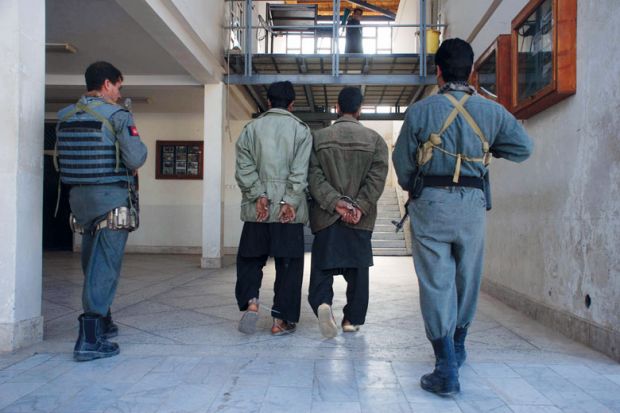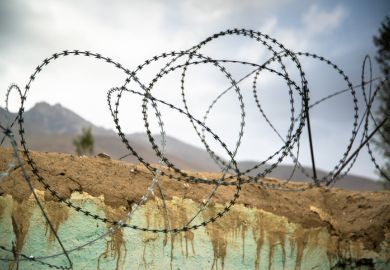An Afghan lecturer and human rights activist has described being beaten daily by Taliban prison guards, amid mounting warnings about the prospects for academia in the country.
Scholars teaching contentious subjects have expressed concern that they will be targeted since US forces’ hurried retreat in August 2021, but although fears of imprisonment and beatings are widespread, first-hand accounts of what happens inside the Taliban’s prisons are rare.
One former Herat University lecturer told Times Higher Education that he had been imprisoned for 12 days in Herat Prison after being seized by a group of five men shortly after he emerged from hiding last November.
“Every morning, I was beaten with a stick,” he said. “I was told: ‘You are a Jew and an infidel. You are Western.’”
The lecturer said his captors asked him about his research activities: “Do you write articles any more? Do you do research any more? Do you still work in the field of human rights?”
In those 12 days, after morning prayer he was beaten until the prison officer got tired. He was not allowed to bathe, and his teeth were broken – and he was charged Af150 (£1.36) a day for his meals.
He is not alone. The lecturer said he knew eight academics who have been imprisoned, beaten or persecuted. Most of them have been accused of promoting democracy and human rights, and collaborating with Western institutions, he said. Some angered the Taliban for minor infractions – such as breaking its traditional dress code.
“Some time ago, a teacher was beaten for wearing a suit with a tie,” he said.
The lecturer’s imprisonment came to an end within weeks when a religious leader’s intervention won his release. Soon after, he fled Afghanistan, entering Iran on a tourist visa. The country shares a border with Afghanistan and has a similar language. But the lecturer did not receive a warm reception there.
“Iran is not a good country for me…Iranians do not consider us human. They call us Afghan donkeys,” he said.
Because the Taliban have blocked his bank account, he is borrowing money from a friend for his daily needs. He lives in a remote village, in a damaged country house. He cannot teach, but he tries to keep up some of his old activities.
“One of the ways I still try to defend human rights these days is by attending some international conferences, webinars, and talking about the situation in Afghanistan,” he said.
It is impossible to say exactly how many Afghan academics have been displaced since the Taliban takeover, but Afghan students and staff have previously told THE about steep declines in university attendance. They said many colleagues – those who could – had left the country.
The lecturer said he worried that things will not change any time soon. But he wanted people in the West to know that “the situation is worse than you think” under the Taliban government, which is introducing more rules to prevent women from seeking education.
He added: “We have a difficult path ahead. [The Taliban] are completely unpredictable, [but] as a human rights defender, I strive to fulfil my mission. I am even ready to lose my life in this way.”
Register to continue
Why register?
- Registration is free and only takes a moment
- Once registered, you can read 3 articles a month
- Sign up for our newsletter
Subscribe
Or subscribe for unlimited access to:
- Unlimited access to news, views, insights & reviews
- Digital editions
- Digital access to THE’s university and college rankings analysis
Already registered or a current subscriber? Login








